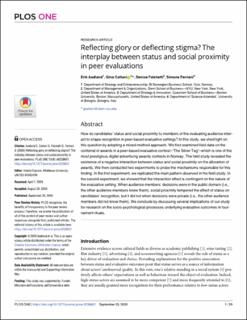Reflecting glory or deflecting stigma? The interplay between status and social proximity in peer evaluations
Journal article, Peer reviewed
Published version
Permanent lenke
https://hdl.handle.net/11250/2976245Utgivelsesdato
2020Metadata
Vis full innførselSamlinger
- Scientific articles [2217]
Sammendrag
How do candidates’ status and social proximity to members of the evaluating audience interact to shape recognition in peer-based evaluative settings? In this study, we shed light on this question by adopting a mixed-method approach. We first examined field data on the conferral of awards in a peer-based evaluative contest–“The Silver Tag”–which is one of the most prestigious digital advertising awards contests in Norway. The field study revealed the existence of a negative interaction between status and social proximity on the allocation of awards. We then conducted two experiments to probe the mechanisms responsible for this finding. In the first experiment, we replicated the main pattern observed in the field study. In the second experiment, we showed that the interaction effect is contingent on the nature of the evaluative setting. When audience members’ decisions were in the public domain (i.e., the other audience members knew them), social proximity tempered the effect of status on candidates’ recognition, but it did not when decisions were private (i.e., the other audience members did not know them). We conclude by discussing several implications of our study for research on the socio-psychological processes underlying evaluative outcomes in tournament rituals.

